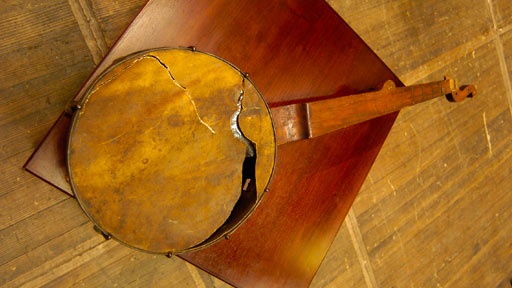The Case:
A beautiful, worn banjo is purchased by a Chicago resident at an auction a few years ago.
A tattered note inside says the banjo dates to the mid-1800s and was bought from a former slave in Bethel, Ohio, by an abolitionist family some time after Emancipation.
According to the note, the slave who owned the banjo and the boy who ultimately purchased the banjo had once shared a classroom. Could this be the only slave banjo known to exist?
History Detectives is off to Ohio and Maryland to trace the roots of two American families divided by racial lines during the Civil War and to track the surprising lineage of an instrument that has contributed to more than 200 years of American music.
Season 3, Episode 4
Detective:
Tukufu Zuberi
 Detective:
Detective:
Wes Cowan
 Location:
Location:Baltimore, Maryland
Related Content
Related Links
Explore
-
 Related Investigation
Beatles Autographs
Are these genuine Beatles signatures?
Related Investigation
Beatles Autographs
Are these genuine Beatles signatures?
-
 Also with Tukufu Zuberi
Ventriloquist Dummy
How did an African-American ventriloquist act become so successful in a time of racial unrest?
Also with Tukufu Zuberi
Ventriloquist Dummy
How did an African-American ventriloquist act become so successful in a time of racial unrest?
-
 Related Investigation
Liberty Bell Pin
Was one of America’s most iconic symbols melted down into a mere memento?
Related Investigation
Liberty Bell Pin
Was one of America’s most iconic symbols melted down into a mere memento?
-
 Also with Tukufu Zuberi
War Dog letter
The military put great effort into a new War Dogs program during WWII. What went wrong on Cat Island?
Also with Tukufu Zuberi
War Dog letter
The military put great effort into a new War Dogs program during WWII. What went wrong on Cat Island?
-
 Also in this episode
Cherokee Bible
What can this bible written in Cherokee tell us about one of the darkest chapters in Indian history?
Also in this episode
Cherokee Bible
What can this bible written in Cherokee tell us about one of the darkest chapters in Indian history?
-
 Also in Civil War: 1850-1877
Clara Barton Letter
What does this letter reveal about America's early efforts to honor its war dead?
Also in Civil War: 1850-1877
Clara Barton Letter
What does this letter reveal about America's early efforts to honor its war dead?
Comments
This is a place for opinions, comments, questions and discussion; a place where viewers of History Detectives can express their points of view and connect with others who value history. We ask that posters be polite and respectful of all opinions. History Detectives reserves the right to delete comments that don’t conform to this conduct. We will not respond to every post, but will do our best to answer specific questions, or address an error.




 Feature:
Feature:
 Feature:
Feature:
 Feature:
Feature: